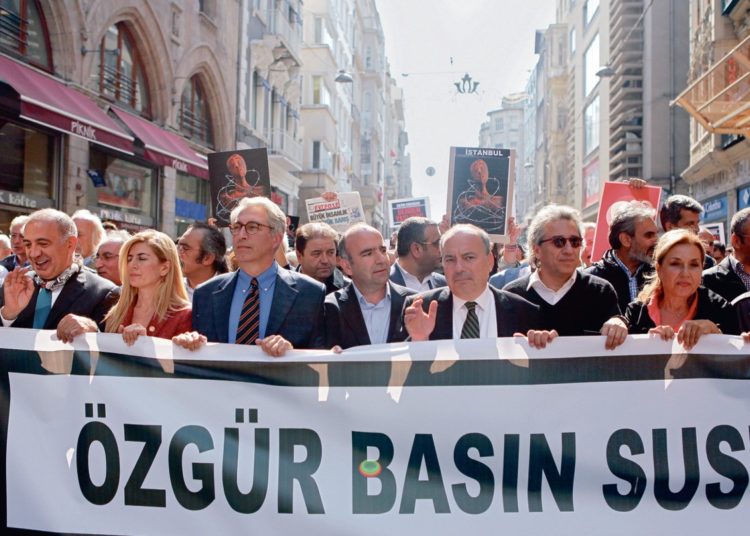Abdullah Bozkurt/Stockholm
An arrest warrant was issued in Turkey for a Turkish journalist who lives in exile in the US over an article he wrote critical of the government of President Recep Tayyip Erdoğan in the aftermath of major graft probes in 2013 that incriminated senior Turkish officials in an Iran sanctions-busting scheme.
Hamit (Abdülhamit) Bilici, a 52-year-old veteran journalist, faces two outstanding arrest warrants issued by Turkish courts and has been the subject of nine criminal investigations by prosecutors for his views critical of the Erdoğan government since 2014.
In an indictment filed for dozens of journalists on April 10, 2017, Istanbul public prosecutor İsmet Bozkurt cited the journalist’s several articles and tweets that apparently bothered the Erdoğan government. He submitted them to the court, claiming they were criminal evidence under the country’s anti-terrorism law.
An article cited as criminal evidence was published in the Zaman daily on December 21, 2013:
One of the articles was published on December 21, 2013 in Zaman, at one time Turkey’s most highly circulated daily, as criminal evidence to support multiple charges leveled against the journalist.
In his opinion piece Bilici criticized the government for trying to undermine corruption probes that incriminated then-prime minister and current President Erdoğan, his family members and his business and political associates.
Citing cases from Germany and the US on how senior officials reacted when they were accused of breaking the law, Bilici said Cabinet ministers and senior officials in Turkey should follow the same path, resign and excuse themselves from official duties for the sake of a through and transparent investigation. “Instead of investigating solid allegations, conspiracies about American and Israeli plots were fabricated [by the government]. While all this was being done, ministers accused of serious offenses remained in their positions,” he wrote in an article titled “I’m ashamed.”
Turkish journalist Hamit Bilici faces two arrest warrants in Turkey and has been the subject of multiple prosecutions since 2014:
The graft scandal revealed that Iranian-Turkish businessman Reza Zarrab had bribed the Cabinet ministers to violate an embargo on Iran imposed by the US in a sanctions-busting scheme that was run through Turkish state-owned Halkbank. Documents disclosed to the public implicitly showed that then-prime minister Erdoğan was at the head of the criminal scheme.
Zarrab bribed Minister for EU affairs Egemen Bağış, now Turkey’s ambassador in Prague, then-Interior Minister Muammer Güler and then-Economy Minister Zafer Çağlayan to run his money laundering scheme on behalf of Iran.
Shortly after the scandal erupted, a leaked phone conversation between Erdoğan and his son Bilal on the day of the police operation, December 17, 2013, revealed that they discussed how to safely transfer a large sum of money from their house in Istanbul to other locations.

After Erdoğan successfully cast the investigations as a coup attempt to overthrow his government orchestrated by his political enemies, the prosecutors and judges whom he claimed were affiliated with the Gülen movement, a group that is critical of Erdoğan, were removed from the case. Police were reassigned and the corruption investigations were dropped. Later, the police officers, judges, and prosecutors who took part in the investigations were all jailed.
Iranian-Turkish gold trader Zarrab was arrested in Miami in 2016 on charges of evading US sanctions on Iran. Zarrab pleaded guilty in federal court and in a plea deal testified about the plot in 2017 as a witness for the prosecution. Zarrab testified that Turkey’s then-prime minister Erdoğan personally ordered a resumption of the plot to launder billions of dollars in Iranian oil revenue and circumvent US sanctions, in parallel with the evidence exposed during the 2013 corruption scandal. Zarrab also admitted that he bribed Cabinet ministers.
Confidential Turkish government documents include an intelligence note about journalist Hamit Bilici that suggests he had been under surveillance by Turkish intelligence:
Bilici and his newspaper Zaman faced a crackdown by the Erdoğan government for covering the graft scandals. Immediately after the graft exposé, Erdoğan publicly targeted Zaman at rallies, asked people to not buy the paper and pressured companies to halt their advertising in the publication. The government campaign against the daily had the opposite effect, with Zaman increasing its subscription numbers to a record level of 1.2 million copies a day.
Failing to discredit the paper, Erdoğan orchestrated a criminal probe into the newspaper, and the government eventually managed to seize it in March 2016. Bilici, who was the editor-in-chief of the daily, was fired immediately by government caretakers who turned Zaman into a government mouthpiece overnight. Circulation dropped to 4,000 in a week after a major reader backlash, and the government shut it down in July 2016, wiping out decades of work in the newspaper’s archives and taking down its website.
Indictment listed journalist Bilici’s tweet as criminal evidence in a sham terrorism case:
Bilici fled Turkey and settled in the US to escape wrongful imprisonment on bogus charges brought by the government. Two still-outstanding arrest warrants were issued for him in 2016, mainly on terrorism charges, the law most abused by the government to prosecute and imprison critical and independent journalists in Turkey. He is the subject of nine criminal investigations launched by public prosecutors in Istanbul.
Confidential documents obtained by Nordic Monitor show that he has been monitored abroad as well. An intelligence note annexed to his case file suggests that Turkish intelligence agency MIT has kept an eye on him over his alleged links to the Gülen movement.
A Turkish prosecutor cited journalist Bilici’s articles as criminal evidence:












